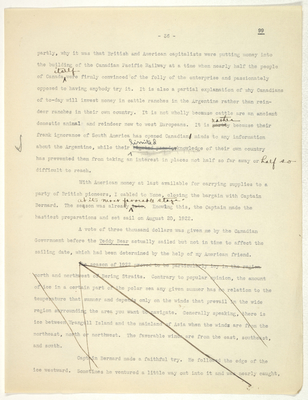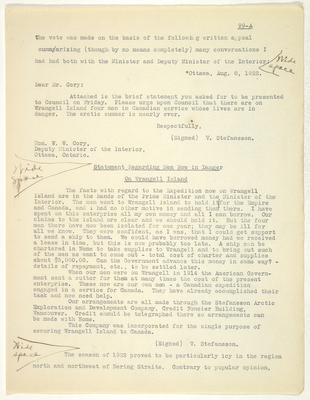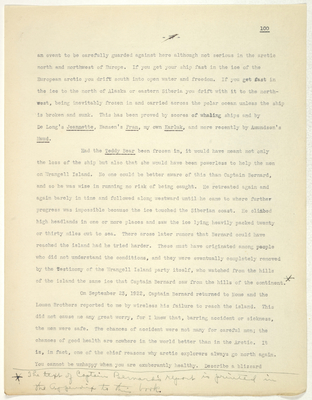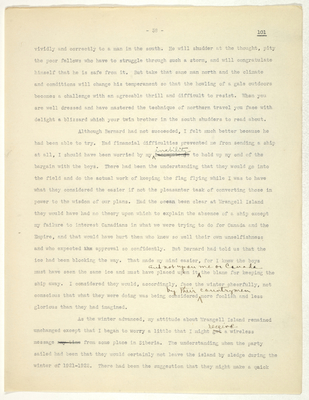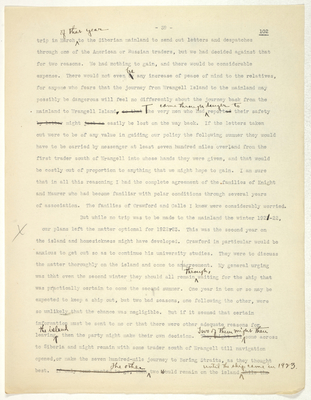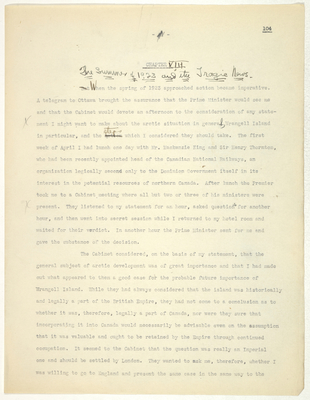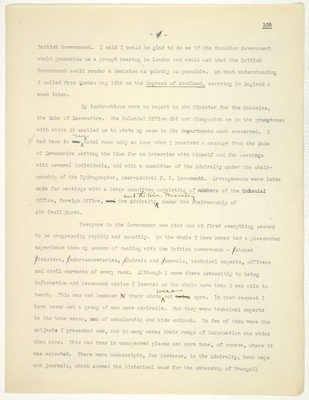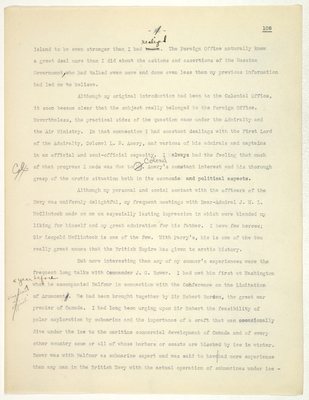Pages That Need Review
stefansson-wrangel-09-27
stefansson-wrangel-09-27-064
- 35 - 98
on the score of national interest. Those in Great Britain or Canada to whom I could appeal on a patriotic basis were in the main strangers to me personally, completely out of touch with the developments I was advocating and unconvinced of their fundamental soundness.
It may seem that Canadians ought to know more about Canada than any other people. But that is a view not based upon observation. It is a commonplace with travelers that the ignorance about the interior of Africa is nowhere so dense as in the cities along the African coast. If you live in Durban Natal or Cape Town you are tempted to assume that you know Africa because you are an African and you take no interest in meeting travelers who have been in the interior, or in reading hooks about their journeys. But if you live in Scotland you are vividly conscious of your lack of knowledge and, if you have an inquiring mind at all, you will grasp every opportunity to converse or read about the interior of Africa. The same is true in Canada where the railway trains fly like shuttles back and forth across the transcontinental railways that follow the southern fringe of the country. You pass Most Canadians who travel in Canada merely attach themselves to these shuttles and dart with them through the industrial cities of the East, the grain fields of the prairies, and through the magnificent forests of British Columbia. and you imagine They clim into the [trains] continental trains expecting to see Canada and they climb out again a few days later [inuaqiurry] that you they know Canada. It is not uncommon to find even these "traveled" Canadians who referring to such places as Edmonton or Cochrane as being in northern Canada. Our Scotchman who depends upon the map knows better. If you try it out it will be your experience as it has been mine, that if you visit in corresponding clubs in of London and Toronto you will find a far higher average of members with intelligent opinions about the whole of Canada in the English London club than you will in the Canadian.
If we you remember, then, the principle that ignorance of the land beyond the frontier is always densest on the frontier, you will know the fundamental reason why it is in particular difficult to interest Canadians in an arctic enterprise and why it is in general difficult to get the, people of any a pioneer country to take an interest in parts of it they have not seen. This explains, at least
stefansson-wrangel-09-27-065
- 36 - 99
partly, why it was that British and American capitalists were putting money into the building of the Canadian Pacific Railway at a time when nearly half the people of Canada itself were firmly convinced of the folly of the enterprise and passionately opposed to having anybody try it. It is also a partial explanation of why Canadians of to-day will invest money in cattle ranches in the Argentine rather than reindeer ranches in their own country. It is not wholly because cattle are an ancient domestic animal and reindeer new to west Europeans. It is partly rather because their frank ignorance of South America has opened Canadians minds to any information about the Argentine, while their bigoted pseudo limited of their own country has prevented them from taking an interest in places not half so far away or half so difficult to reach.
With American money at last available for carrying supplies to a party of British pioneers, I cabled to Nome, closing the bargain with Captain Bernard. The season was already at its most favorable stage into. Knowing this, the Captain made the hastiest preparations and set sail on August 20, 1922.
A vote of three thousand dollars was.given me by the Canadian Government before the Teddy Bear actually sailed but not in time to affect the sailing date, which had. been determined by the help of my American friend.
The season of 1922 proved to be particularly icy in the region north and northwest of Bering Straits. Contrary to popular opinion, the amount of ice in a certain part of the polar sea any given summer has no relation to the temperature that summer and depends only on the winds that prevail in the wide region surrounding the area you want to navigate. Generally speaking ,there is ice between Wrangell Island and the mainlana of Asia when the winds are from the northeast, north or norhwest. The favorable winds are from the east, southeast, and south.
Captan Bernard made a faithful try. He followed the edge of the ice westward. Sometimes he ventured a little way out into it and wa. nearly caught.
stefansson-wrangel-09-27-066
99-A
the vote was made on the basis of the followin g written appeal summparizing (though by no means completely) many conversations I had had both with the Minister and Deputy Minister of the Interior:
Wide space
"Ottawa, Aug. 8, 1922.
Dear Mr. Cory:
Attached is the brief statement you aslced for to be presented to Council on Friday. Please urge upon Council that there are on Wrangell Island four men in Canadian service whose lives are in danger. The arctic summer is nearly over.
Respectfully,
(Signed) V. Stefansson.
Hon. W. W. Cory, Deputy Minister of the Interior, Ottawa, Ontario.
Wide space
Statement Regarding Men Now in Danger On Wrangell Island
The facts with regard to the Expedition now on Wrangell Island are in the hands of the Prime Minister and the Minister of the Interior. The men vrent to Wrangell Island to hold itfor the Empire and Canada, and I had no other motive in sending them there. I have spent on this enterprise all my own money and all I can borrow. Our claims to the island are clear and we should hold it. But the four men there have now been isolated for one year; they may be ill for all we know. They were confident, as I was, that I could get support to send a ship to them. We could have borrowed money had we received a lea.se in time, but this is now probably too late. A ship can be chartered in Nome to take supplies to Wrangell and to bring out such of the men as want to come out - total cost of charter and supplies about $5,000.00. Can the Government advance this money in some way? - details of repayment, etc., to be settled later.
When our men were on Wrangell in 1914 the American Government sent a cutter for them at many times the cost of the present enterprise. These now are our own men - a Canadian expedition engaged in a service for Canada. They have already accomplished their task and now need help.
Our arrangements are all made through the Stefansson Arctic Exploration and Development Company, Credit Foncier Building, Vancouver. Credit should be telegraphed there so arrangements can be made with Nome.
This Company was incorporated for the single purpose of securing Wrangell Island to Canada.
(Signed) V. Stefansson.
Wide space
The season of 1922 proved to be particularly icy in the region north and northwest of Bering Straits. Contrary to popular opinion,
stefansson-wrangel-09-27-068
- 37 - 100
an event to be carefully guarded against here although not serious in the arctic north and northwest of Europe. If you get your ship fast in the ice of the European arctic you drift south into open water and freedom. If you get fast in the ice to the north of Alaska or eastern Siberia yoix drift with it to the northwest, being inevitably frozen in and carried across the polar ocean unless the ship is broken and sunk. This has been proved by scores of whaling ships and by De Long's Jeannette, Nansen's Fram, my own Karluk, and more recently by Amundsen's Maud.
Had the Teddy Bear been frozen in, it would have meant not only the loss of the ship but also that she would have been powerless to help the men on Wrangell Island. No one could be better aware of this than Captain Bernard, and so he was wise in running no risk of being caught. He retreated again and again barely in time and followed along westward until he came to where further progress was impossible because the ice touched the Siberian coast. He climbed high headlands in one or more places and saw the ice lying heavily packed twenty or thirty miles out to sea. There arose later rumors that Bernard could have reached the island had he tried harder. These must have originated among people who did not understand the conditions, and they were eventually completely removed by the testimony of the Wrangell Island party itself, who watched from the hills of the island the same ice that Captain Bernard saw from the hills of the continent.
On September 23, 1922, Captain Bernard returned to Nome and the Lomen Brothers reported to me by wireless his failure to reach the island. This did not cause me any great worry, for I knew that, barring accident or sickness, the men were safe. The chances of accident were not many for careful men; the chances of good health are nowhere in the world better than in the Arctic. It is, in fact, one of the chief reasons why arctic explorers always go north again. You cannot be unhappy when you are exuberantly healthy. Describe a blizzard
The text of Captian Bernard's report is printed in the Appendix to this book.
stefansson-wrangel-09-27-069
- 38 - 101
vividly and correctly to a man in the south. He will shudder at the thought, pity the poor fellows who have to struggle through such a storm, and will congratulate himself that he is safe from it. But take that same man north and the climate and conditions will change his temperament so that the howling of a gale outdoors becomes a challenge with an agreeable thrill and difficult to resist. When you are well dressed and have mastered the technique of northern travel you face with delight a blizzard which your twin brother in the south shudders to read about.
Although Bernard had not succeeded, I felt much better because he had been able to try. Had financial difficulties prevented me from sending a ship at all, I should have been worried by my incompetance inability to hold up my end of the bargain with the boys. There had been the understanding that they would go into the field and do the actual work of keeping the flag flying while I was to have what they considered the easier if not the pleasanter task of converting those in power to the wisdom of our plans. Had the ocean been clear at Wrangell Island they would have had no theory upon which to explain the absence of a ship except my failure to interest Canadians in what we were trying to do for Canada and the Empire, and that would have hurt them who knew so well their own unselfishness and who expected the approval so confidently. But Bernard had told us that the ice had been blocking the way. That made my mind easier, for I knew the boys must have seen the same ice and must have placed upon it and not upon me or Canada the blame for keeping the ship away. I considered they would, accordingly, face the winter cheerfully, not conscious that what they were doing was being cousidered by thier countrymen foolish and less glorious than they had imagined.
As the winter advanced, my attitude about Wrangell Island remained unchanged except that I began to worry a little that I might got receive a wireless message any time from some place in Siberia. The understanding when the party sailed had been that they would certainly not leave the island by sledge during the winter of 1921-1922. There had been the suggestion that they might make a quick
stefansson-wrangel-09-27-070
- 39 - 102
trip in March of that year to the Siberian mainland to send out letters and despatches through one of the American or Russian traders, but we had decided against that for two reasons. We had nothing to gain, and there would be considerable expense. There would not even be by any increase of peace of mind to the relatives, for anyone who fears that the journey from Wrangell Island to the mainland may possibly be dangerous will feel no differently about the journey back from the mainland to Wrangell Island. so that The very men who had come through danger to reported their safety by letter might just as easily be lost on the way back. If the letters taken out were to be of any value in guiding our policy the following summer they would have to be carried by messenger at least seven hundred miles overland from the first trader south of Wrangell into whose hands they were given, and that would he costly out of proportion to anything that we might hope to gain. I am sure that in all this reasoning I had the complete agreement of the families of Knight and Maurer who had become familiar with polar conditions through several years of association. The families of Crawford and Galle I knew were considerably worried.
But while no trip was to be made to the mainland the winter 19221-22, our plans left the matter optional for 1922-23. This was the second year on the island and homesickness might have developed. Crawford in particular would be anxious to get out so as to continue his university studies. They were to discuss the matter thoroughly on the island and come to anagreement. My general urging was that even the second winter they should all remain through, waiting for the ship that was practically certain to come the second summer. One year in ten or so may be expected to keep a ship out, but two bad seasons, one following the other, were so unlikely that the chance was negligible. But if it seemed that certain information must be sent to me or that there were other adequate reasons for, leaving the island, then the party might make their own decision. They might all Two of them might [there] come across to Siberia and might remain with some trader south of Wrangell till navigation opened,or make the seven hundred-mile journey to Bering Straits, as they thought best. If only some wanted to go, then The other two cwould remain on the island until the ship came in 1923. while the
stefansson-wrangel-09-27-071
- 40 - 103
other two crossed over. The danger of crossing was somewhat greater than that of staying on the island but, since all of us considered the journey to the Siberian mainland a comparatively simple one, it is difficult to say now whether we weighed the danger at all in our planning.
Although somewhat difficult and expensive, a journey by our men from Wrangell Island to the outside world could have been undertaken any time between January and April with the purpose hope of reaching "civilization" a month or two before the opening of arctic navigation. Doing this might seem advisable to them on the basis of what they knew about conditions on Wrangell Island. Their objectives purposes in the island were two - the continuance of occupation and the gathering of knowledge. The occupation had been accomplished. and kKnowledge even when recorded in notebooks and photographs, is the most portable of commodities. They could, therefore, leave the island if they liked. But a journey from the outside to Wrangell Island similarly undertaken in winter by myself, for instance, would not to have been practical. The island could be reached before spring, but a party coming over the ice from Siberia could bring to the island no appreciable amount of supplies. The only way in which succor could can be brought in winter to a party isolated on Wrangell Island would be there is by sending in a hunter of greater skill than the ones on the island. But we had no reason to fear that assistance was needed and no reason to think that the skill of the men on the island was inadequate to meet the situation. In consequence I attempted no active undertaking during the winter 1922-1923, devoting myself merely to writing and speaking along lines which I thought would eventually bring conviction to the public and the Government, wau and win from them the sympathy and support we needed.
stefansson-wrangel-09-28
stefansson-wrangel-09-28-001
- [1] -104
CHAPTER VIII
The Summer of 1923 and the Tragic News.
But When the spring of 1923 approached action became imperative. A telegram to Ottawa brought the assurance that the Prime Minister would see me and that the Cabinet would devote an afternoon to the consideration of any stateX ment I might want to make about the arctic situation in general, Wrangell Island in particular, and the action steps which I considered they should take. The first week of April I had lunch one day with Mr. Mackenzie King and Sir Henry Thornton, who had been recently appointed head of the Canadian National Railways, an organization logically second only to the Dominion Government itself in its interest in the potential resources of northern Canada. After lunch the Premier took me to a Cabinet meeting where all but two or three of his ministers were X present. They listened to my statement for an hour, asked questions for another hour, and then went into secret session while I returned to my hotel room and waited for their verdict. In another hour the Prime Minister sent for me and gave the substance of the decision.
The Cabinet considered, on the basis of my statement, that the general subject of arctic development was of great importance and that I had made out what appeared to them a good case for the probable future importance of Wrangell Island. While they had always considered that the island was historically and legally a part of the British Empire, they had not come to a conclusion as to whether it was, therefore, legally a part of Canada, nor were they sure that incorporating it into Canada would necessarily be advisable even on the assumption that it was valuable and ought to be retained by the Empire through continued occupation. It seemed to the Cabinet that the question was really an Imperial one and should be settled by London. They wanted to ask me, therefore, whether I was willing to go to England and present the same case in the same way to the
stefansson-wrangel-09-28-002
105
- 42 -
British Government. I said I would be glad to do so if the Canadian Government would guarantee me a prompt hearing in London and would ask that the British Government would render a decision as quickly as possible. On that understanding I sailed from Quebec May 15th on the Empress of Scotland, arriving in England a week later.
My instructions were to report to the Minister for the Colonies, the Duke of Devonshire. The Colonial Office did not disappoint me in the promptness with which it enabled me to state my case to the departments most concerned. I X had been in the my hotel room only an hour when I received a message from the Duke of Devonshire setting the time for an interview with himself and for meetings with several individuals, and with a committee of the Admiralty under the chairmanship of the Hydrographer, Rear-Admiral F. C. Learmonth. Arrangements were later made for meetings with a large committee consisting of members of the Colonial Office, Foreign Office, and the Admiralty and the Air Ministry, under the chairmanship of Sir Cecil Hurst.
Everyone in the Government was kind and at first everything seemed to be progressing rapidly and smoothly. On the whole I have never had a pleasanter experience than my summer of dealing with the British Government - Cabinet Ministers, Under-secretaries, Admirals and Generals, technical experts, officers and civil servants of every rank. Although I came there ostensibly to bring information and recommend action I learned on the whole more than I was able to teach. This was not because of their minds were not being open. In that respect I have never met a group of men more admirable. But they were technical experts in the true sense, men of scholarship and wide outlook. To few of them were the subjects I presented new, and in many cases their range of information was wider than mine. This was true in unexpected places and more true, of course, where it was expected. There were manuscripts, for instance, in the Admiralty, both maps and journals, which showed the historical case for the ownership of Wrangell
stefansson-wrangel-09-28-003
106
- 43 -
Island to be even stronger than I had known realized. The Foreign Office naturally knew a great deal more than I did about the actions and assertions of the Russian Government, who had talked even more and done even less than my previous information had led me to believe.
Although my original introduction had been to the Colonial Office, it soon became clear that the subject really belonged to the Foreign Office. Nevertheless, the practical sides of the question came under the Admiralty and the Air Ministry. In that connection I had constant dealings with the First Lord of the Admiralty, Colonel L. S. Amery, and various of his admirals and captains in an official and semi-official capacity. I always had the feeling that much [in margin: Col.] of what progress I made was due to Mr. Colonel Amery's constant interest and his thorough grasp of the arctic situation both in its economic and political aspects.
Although my personal and social contact with the officers of the Navy was uniformly delightful, my frequent meetings with Rear-Admiral J. W. L. McClintock made on me an especially lasting impression in which blended my liking for himself and my great admiration for his father. I have few heroes; Sir Leopold McClintock is one of the few. With Parry's, his is one of the two really great names that the British Empire has given to arctic history.
But more interesting than any of my summer's experiences were the frequent long talks with Commander J. G. Bower. I had met him first at Washington a year before when he accompanied Balfour in connection with the Conference on the Limitation [in margin: singular is official] of Armaments. We had been brought together by Sir Robert Borden, the great war premier of Canada. I had long been urging upon Sir Robert the feasibility of polar exploration by submarine and the importance of a craft that can occasionally dive under the ice to the maritime commercial development of Canada and of every other country some or all of whose harbors or coasts are blocked by ice in winter. Bower was with Balfour as submarine expert and was said to have/had more experience than any man in the British Navy with the actual operation of submarines under ice -

